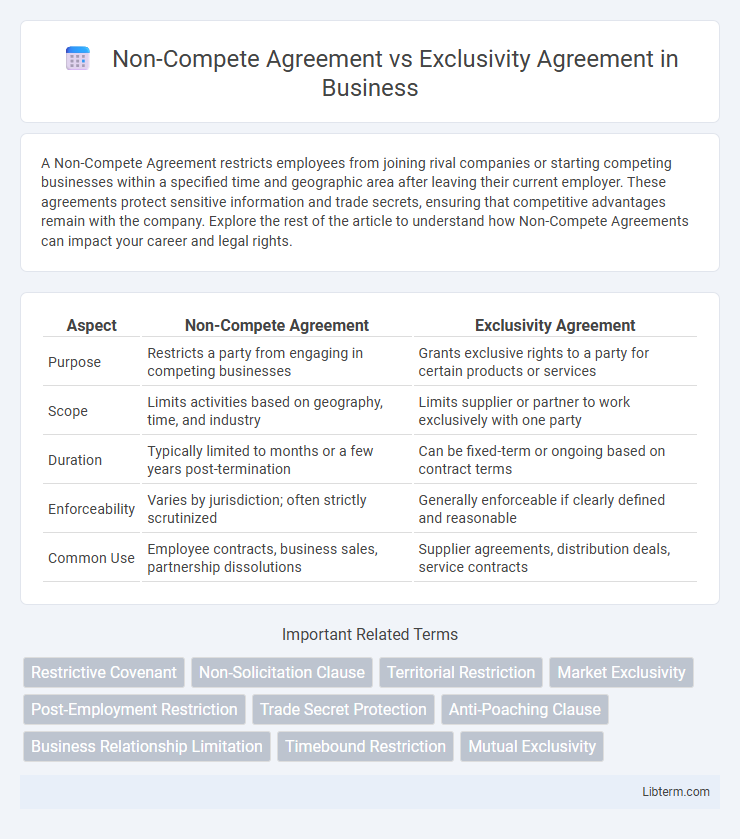A Non-Compete Agreement restricts employees from joining rival companies or starting competing businesses within a specified time and geographic area after leaving their current employer. These agreements protect sensitive information and trade secrets, ensuring that competitive advantages remain with the company. Explore the rest of the article to understand how Non-Compete Agreements can impact your career and legal rights.
Table of Comparison
| Aspect | Non-Compete Agreement | Exclusivity Agreement |
|---|---|---|
| Purpose | Restricts a party from engaging in competing businesses | Grants exclusive rights to a party for certain products or services |
| Scope | Limits activities based on geography, time, and industry | Limits supplier or partner to work exclusively with one party |
| Duration | Typically limited to months or a few years post-termination | Can be fixed-term or ongoing based on contract terms |
| Enforceability | Varies by jurisdiction; often strictly scrutinized | Generally enforceable if clearly defined and reasonable |
| Common Use | Employee contracts, business sales, partnership dissolutions | Supplier agreements, distribution deals, service contracts |
Introduction to Non-Compete and Exclusivity Agreements
Non-Compete Agreements restrict an employee or party from engaging with competing businesses during or after their contract term to protect proprietary interests. Exclusivity Agreements require one party to work solely with another, limiting collaboration with competitors for a specified period to ensure dedicated business relations. Both agreements safeguard competitive advantage but serve distinct legal and operational purposes.
Defining Non-Compete Agreements
Non-Compete Agreements restrict employees or business partners from engaging in competing activities within a specific geographic area and time frame to protect proprietary business interests. These contracts are crucial in safeguarding trade secrets, client relationships, and competitive advantages by preventing direct competition after the end of employment or collaboration. Unlike Exclusivity Agreements, which limit parties from working with others, Non-Compete Agreements specifically curtail competitive business operations to maintain market position.
Understanding Exclusivity Agreements
Exclusivity agreements restrict a party from engaging with competitors or third parties, ensuring commitment to a single business relationship. These contracts are common in supplier, distributor, and employment arrangements, where exclusive rights or services are granted for a defined period. Understanding exclusivity agreements involves recognizing their impact on market competition, potential limitations on partner freedoms, and the legal enforceability depending on jurisdiction and specific terms.
Key Differences Between Non-Compete and Exclusivity Agreements
Non-compete agreements restrict an employee or business partner from engaging in competing activities within a specific geographic area and time frame, protecting trade secrets and market share. Exclusivity agreements require a party to purchase goods or services solely from one supplier or work exclusively with one business, aiming to secure loyalty and reduce competition. The key difference lies in non-competes limiting competitive actions, while exclusivity agreements control exclusive relationships and sourcing commitments.
Legal Enforceability of Non-Compete Agreements
Non-compete agreements often face strict legal scrutiny due to their potential to restrict an individual's ability to work, with enforceability varying significantly by jurisdiction and typically requiring reasonable scope, duration, and geographic limitations. Courts generally uphold non-compete clauses only if they protect legitimate business interests such as trade secrets or client relationships, while overly broad or indefinite restrictions are likely to be deemed unenforceable. In contrast, exclusivity agreements focus on limiting business dealings rather than employment options, often resulting in fewer enforceability challenges compared to non-compete clauses.
Common Clauses in Exclusivity Agreements
Exclusivity agreements commonly include clauses specifying the duration of exclusivity, defining the scope of exclusive rights to specific products or services, and outlining territorial restrictions where exclusivity applies. These agreements often contain performance obligations requiring parties to meet certain sales targets or marketing efforts to maintain exclusivity. Confidentiality provisions and termination clauses based on breach or failure to meet exclusivity terms are also standard in exclusivity agreements.
When to Use a Non-Compete Agreement
Use a Non-Compete Agreement when an employer needs to protect sensitive business information, trade secrets, or client relationships by restricting an employee's ability to work with direct competitors after leaving the company. These agreements are most effective in industries with high competition and innovation, such as technology, finance, and healthcare. Non-Compete Agreements should be carefully tailored to specific roles and geographic areas to ensure enforceability and legal compliance.
When to Choose an Exclusivity Agreement
Choose an exclusivity agreement when a business aims to secure a partner's commitment to sell or promote only its products or services, ensuring market focus and reducing competition within a specified territory or timeframe. This agreement is ideal for exclusive distribution deals, franchise arrangements, or strategic partnerships where brand loyalty and market control are critical. It contrasts with non-compete agreements, which primarily restrict former employees or partners from engaging with competitors after separation rather than regulating ongoing business exclusivity.
Potential Risks and Challenges
Non-Compete Agreements pose potential risks such as limiting employee mobility and creativity, which can lead to legal disputes over enforceability and overly broad restrictions. Exclusivity Agreements may create challenges by restricting a party's ability to engage with other business partners, potentially resulting in reduced market opportunities and strained business relationships. Both agreements require careful drafting to balance protection of business interests with fairness to involved parties, minimizing litigation risks and ensuring compliance with jurisdictional laws.
Best Practices for Drafting and Negotiating These Agreements
Best practices for drafting non-compete agreements include clearly defining the scope, geographic area, and duration to ensure enforceability and avoid overly restrictive terms. Exclusivity agreements should specify the exact obligations and timeframes, balancing the need for commitment with flexibility to maintain business relationships. Both agreements benefit from transparent negotiation, mutual consideration, and compliance with jurisdiction-specific laws to protect parties' interests and minimize litigation risks.
Non-Compete Agreement Infographic

 libterm.com
libterm.com